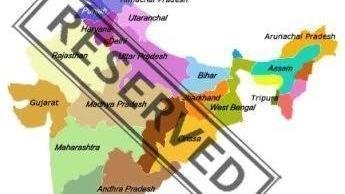Imputing “utter discrimination” by National Law University, Delhi, a writ petition for reservation has been filed before the Delhi High Court seeking quashing of the provision giving 50% reservation to students who passed their qualifying exam from institute located within the National Capital Territory.
The petitioner Pia Singh has submits that the reservation policy of respondent University to give 50% reservation to those students who have passed their qualifying degree from Institute situated in Delhi is not only against the constitutional mandate under art 15(3) but is also against all reasonable and logical norms.
It is argued that the classification for 50% reservation to students who have passed their qualifying degree from Institute situated in Delhi is far away from intelligible differentia. Also, there seems no object behind this classification which the respondent university seeks to achieve.

“Since, the petitioner belongs to General/Unreserved category, and is also a permanent resident of Delhi and intends to pursue her LL.M. from NLU Delhi; the provision of 50% reservation to the students of Delhi and also, the provision of 22% OBC & 10% EWS reservations in LL.M. without increasing the number of seats as per MHRD guidelines is adversely affecting her chances of selection and her future career prospects”, it is urged.
The petitioner has averred that In the previous academic year i.e. 2019-20 total seats for LL.M was 70. Out of these seats 15% for SC & 7.5% for ST were vertically reserved and 5% for PWD were horizontally reserved. There was no other kind of reservation provided to any class, so number of seats were following: Total seats=70
CATEGORY / NO. OF SEATS
UNRESERVED 64 (including 3 PWD seats)
SC 11 (including 1 PWD seats)
ST 5
“It is apparent by analysing seat matrix of both academic years that in the previous year seats for unreserved category were 64 but in this academic year only 30 seats were notified for the unreserved category. Hence, NLU Delhi has grossly violated the guidelines issued by MHRD and reservation for OBC & EWS were implemented without increasing the seats”, it is sought to be contended.
The petitioner highlighting reservation has pointed out,
It is admitted that “any State can give a reservation to the ‘domiciled’ person of the state, reason being that such state funds the institute and hence may seek welfare for the residents of that particular state”. “But respondent university is not giving this reservation to the domicile of the state but to the students who have passed their qualifying examination from Delhi. Delhi is a metro city and capital of India and a hub for the prominent educational institutes. Students from every corner of the country came here to study. Circumstances may arise that many students who are the permanent resident of Delhi may not get admission in any oschool/college situated in Delhi and they got enrolled in any other institutes located outside Delhi”, it is argued. “In such cases, these students who are permanent residents of Delhi would be paying all taxes to the state of Delhi but will not get the reservation in the Institution of their State instead any other student from down south, east, west or north will get that benefit”.
“The classification for the students of distance education is not only ridiculously drafted, but also, sufficient to stunt any prudent, right thinking and reasonable person. Those students whose Centre is located in Delhi will get the benefit of reservation, as such students will be considered as students of Delhi. This classification is harassing and imaginary only. Thousands of such Institution work in Delhi NCR and surrounding states whose Centre of examination falls in Delhi for the sake of convenience. And the Centre of examination is completely dependent on the discretion of the examination authority. In distance education a student comes only for examination to that Centre. This classification has created a sheer absurd situation in which any student from any part of India will come for a few days for his examination only (his institute though situated out of Delhi) and will get “Students of Delhi” reservation”, reads the plea.
The Petitioner has alleged that she failed to carved out from where the respondent University drew the power to implement such reservation policy “because it is published nowhere that state assembly of NCT Delhi has made any law related to this 50% reservation”. “Hence, making such provision of reservation by way of an executive order is also against the law enshrined under Article 14 & 15”, it is pointed out.
“And even we consider that the University has such power then also the quantum of reservation i.e. 50% is bad in law as it has reduced the all India unreserved category seats to the extent of 20% of total seats. If we add up all the kinds of reservation provided by the respondent university then the quantum of total reservation is 80% which means, now OBC reserved seats are more than the Unreserved category seats. Hence, quantum of 50% reservation is also against the principle of equality enshrined under part-III of the constitution”, it is suggested.

